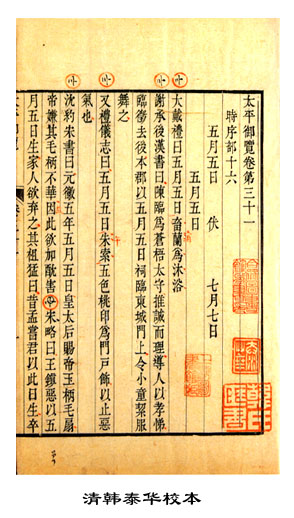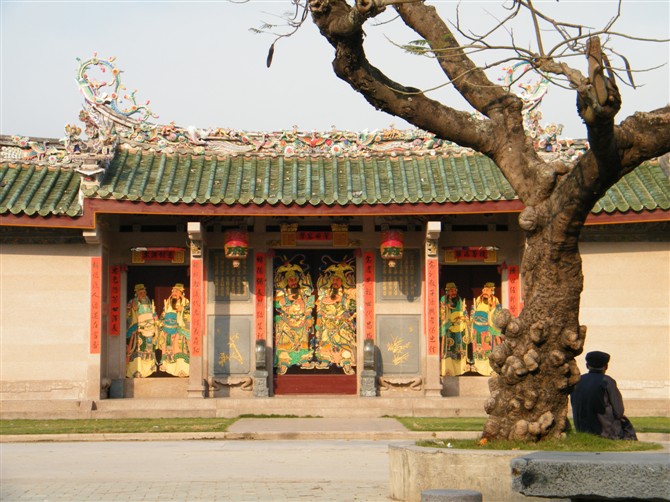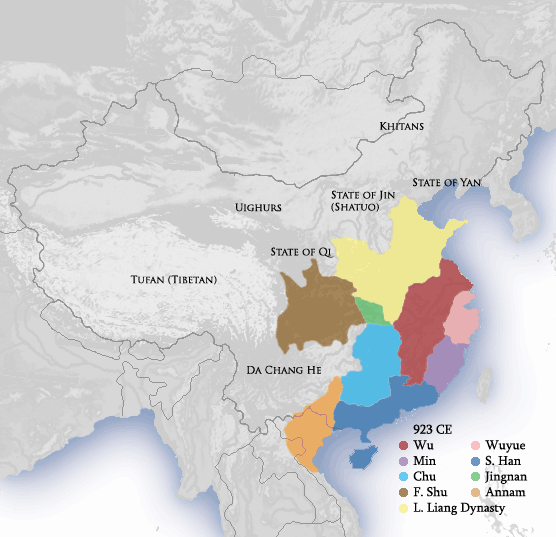|
Shiben
The ''Shiben'' or ''Book of Origins'' (Pinyin: ''shìběn''; Chinese; 世本; ) was an early Chinese encyclopedia which recorded imperial genealogies from the mythical Three Sovereigns and Five Emperors down to the late Spring and Autumn period (771–476 BCE), explanations of the origin of clan names, and records of legendary and historical Chinese inventors. It was written during the 2nd century BC at the time of the Han dynasty. Title The title combines the common Chinese words ''shì'' 世 "generation; epoch; hereditary; world" and ''běn'' 本 "root; stem; origin; fundament; wooden tablet". The personal name of Emperor Taizong of Tang (r. 627–650) was ''Shimin'' 世民, and owing to the strict naming taboo against writing an emperor's name, the ''Shiben'' 世本 title was changed to ''Xiben'' 系本 or ''Daiben'' 代本 (with the ''shi'' near-synonyms of ''xi'' 系 "system; series; family" and ''dai'' 代 "substitute; generation; dynasty"). Although this Chinese title ... [...More Info...] [...Related Items...] OR: [Wikipedia] [Google] [Baidu] |
Chinese Encyclopedia
Chinese encyclopedias comprise both Chinese-language encyclopedias and foreign-language ones about China or List of China-related topics, Chinese topics. There is a type of native Chinese reference work called ''leishu'' (lit. "categorized writings") that is sometimes translated as "encyclopedia", but although these collections of quotations from classic texts are expansively "encyclopedic", a ''leishu'' is more accurately described as a "compendium" or "anthology". The long history of Chinese encyclopedias began with the (222 CE) ''Huanglan'' ("Emperor's Mirror") ''leishu'' and continues with online encyclopedias such as the ''Baike.com, Baike Encyclopedia''. Terminology The Chinese language has several translation equivalents for the English word ''encyclopedia''. ''Diǎn'' wikt:典, 典 "standard; ceremony; canon; allusion; dictionary; encyclopedia" occurs in compound (linguistics), compounds such as ''zìdiǎn'' wikt:字典, 字典 "character dictionary; lexicon", ''cídiǎn'' ... [...More Info...] [...Related Items...] OR: [Wikipedia] [Google] [Baidu] |
Three Sovereigns And Five Emperors
The Three Sovereigns and Five Emperors were two groups of mythological rulers in ancient north China. The Three Sovereigns supposedly lived long before The Five Emperors, who have been assigned dates in a period from 3162 BC to 2070 BC. Today they may be considered culture heroes. The dates of these mythological figures may be fictitious, but according to some accounts and reconstructions, they supposedly preceded the Xia Dynasty. Description The Three Sovereigns, sometimes known as the Three August Ones, were said to be god-kings or demigods who used their divine abilities to improve the lives of the Chinese peoples and gift them essential skills and valuable knowledge. The Five Emperors are portrayed as exemplary ancestral sages who possessed a great moral character and lived to an extremely old age and ruled over a period of great Chinese peace. The Three Sovereigns on the other hand are ascribed various identities in different Chinese historical texts. These high kin ... [...More Info...] [...Related Items...] OR: [Wikipedia] [Google] [Baidu] |
Small Seal Script
The small seal script (), or Qin script (, ''Qínzhuàn''), is an archaic form of Chinese calligraphy. It was standardized and promulgated as a national standard by the government of Qin Shi Huang, the founder of the Chinese Qin dynasty. Name Xiaozhuan, formerly romanized as Hsiao-chuan, is also known as the seal script or lesser seal script. History Before the Qin conquest of the six other major warring states of Zhou China, local styles of characters had evolved independently of one another for centuries, producing what are called the "Scripts of the Six States" (), all of which are included under the general term "great seal script". However, under one unified government, the diversity was deemed undesirable as it hindered timely communication, trade, taxation, and transportation, and as independent scripts might be used to represent dissenting political ideas. Hence, Emperor Qin Shi Huang mandated the systematic unification of weights, measures, currencies, etc., an ... [...More Info...] [...Related Items...] OR: [Wikipedia] [Google] [Baidu] |
Liu Xiang (scholar)
Liu Xiang (77–6BCE), born Liu Gengsheng and bearing the courtesy name Zizheng, was a Chinese astronomer, historian, poet, politician, librarian, and writer of the Western Han Dynasty. Among his polymathic scholarly specialties were history, literary bibliography, and astronomy. He is particularly well known for his bibliographic work in cataloging and editing the extensive imperial library. Life Liu Gengsheng was born in Xuzhou. Being a distant relative of Liu Bang, the founder of the Han dynasty, he was thus a member of the ruling dynastic clan (the Liu family). Liu Xiang's father ranked as a marquess. Liu Xiang's son, Liu Xin, would continue the scholarly tradition of his father and his relative Liu An (the Prince of Huainan). By the beginning of Han Yuandi's reign, Liu Xiang was a member of a group of Confucian officials, including Xiao Wangzhi, who wished to limit the power of the emperor's female family members relatives' clans, the Shi and the Xu. He ended up on the ... [...More Info...] [...Related Items...] OR: [Wikipedia] [Google] [Baidu] |
Zupu
A Chinese kin, lineage or sometimes rendered as clan, is a patrilineal and patrilocal group of related Chinese people with a common surname sharing a common ancestor and, in many cases, an ancestral home. Description Chinese kinship tend to be strong in southern China, reinforced by ties to an ancestral village, common property, and often a common spoken Chinese dialect unintelligible to people outside the village. Kinship structures tend to be weaker in northern China, with clan members that do not usually reside in the same village nor share property. ''Zupu''—the genealogy book A ''zupu'' () is a Chinese kin register or genealogy book, which contains stories of the kin's origins, male lineage and illustrious members. The register is usually updated regularly by the eldest person in the extended family, who hands on this responsibility to the next generation. The "updating" of one's ''zupu'' () is a very important task in Chinese tradition, and can be traced back thousands ... [...More Info...] [...Related Items...] OR: [Wikipedia] [Google] [Baidu] |
Former Shu
Great Shu (Chinese: 大蜀, Pinyin: Dàshǔ) called in retrospect Former Shu (Chinese: 前蜀, Pinyin: Qiánshǔ) or occasionally Wang Shu (王蜀), was one of the Ten Kingdoms formed during the chaotic period between the rules of the Tang dynasty and the Song dynasty. It existed in 907–925 CE. It was the third state named "Shu" on the same territory, the second one having been Shu Han. The country's name changed from "Shu" to "Han" (Chinese: 漢, Pinyin: Hàn) in 917–918, which is not to be confused with another contemporaneous Chinese kingdom during the same Five Dynasties and Ten Kingdoms period, the Southern Han (), 917–971 CE. Founding of the Former Shu Wang Jian was named military governor of western Sichuan by the Tang court in 891. As the Tang Dynasty weakened and eventually fell in 907, Wang was able to expand his holdings into eastern Sichuan and took the title of emperor as the Tang fell in 907. Geographical extent of the Former Shu The Shu was based in it ... [...More Info...] [...Related Items...] OR: [Wikipedia] [Google] [Baidu] |
Sui Dynasty
The Sui dynasty (, ) was a short-lived imperial dynasty of China that lasted from 581 to 618. The Sui unified the Northern and Southern dynasties, thus ending the long period of division following the fall of the Western Jin dynasty, and laying the foundations for the much longer lasting Tang dynasty. Founded by Emperor Wen of Sui, the Sui dynasty capital was Chang'an (which was renamed Daxing, modern Xi'an, Shaanxi) from 581–605 and later Luoyang (605–18). Emperors Wen and his successor Yang undertook various centralized reforms, most notably the equal-field system, intended to reduce economic inequality and improve agricultural productivity; the institution of the Five Departments and Six Board (五省六曹 or 五省六部) system, which is a predecessor of Three Departments and Six Ministries system; and the standardization and re-unification of the coinage. They also spread and encouraged Buddhism throughout the empire. By the middle of the dynasty, the newly unifi ... [...More Info...] [...Related Items...] OR: [Wikipedia] [Google] [Baidu] |
Reference Works
A reference work is a work, such as a paper, book or periodical (or their electronic equivalents), to which one can refer for information. The information is intended to be found quickly when needed. Such works are usually ''referred'' to for particular pieces of information, rather than read beginning to end. The writing style used in these works is informative; the authors avoid use of the first person, and emphasize facts. Indices are a common navigation feature in many types of reference works. Many reference works are compiled by a team of contributors whose work is coordinated by one or more editors, rather than by an individual author. Updated editions are usually published as needed, in some cases annually (''Whitaker's Almanack'', ''Who's Who''). Reference works include almanacs, atlases, bibliographies, biographical sources, catalogs such as library catalogs and art catalogs, concordances, dictionaries, directories such as business directories and telephone ... [...More Info...] [...Related Items...] OR: [Wikipedia] [Google] [Baidu] |
Wang Mo
Wang Mo (traditional Chinese: ; simplified Chinese: ; pinyin: Wáng Mó; Wade-Giles: Wang Mo) (born 1895) was a politician and educator in the Republic of China. He was an important politician during the Wang Jingwei regime (Republic of China-Nanjing). He was born in Yilong, Sichuan. Biography Wang Mo went to Japan where he graduated the Tokyo Teacher's High School (; Now, the Tokyo University of Education, ) and the Tokyo Imperial University. Later he returned to China, he successively held the positions of Professor of the National University of Wuchang (), National University of Beiping (), Teacher's College () and Tsinghua University.Asahi Shimbun, November 12, 1943, p.2. And he was also elected to Senator of the Beijing Government. Later he worked as president of the National Teacher's University of Beiping (), from 1942, he also worked for the professor this University. In November 1943, upon the North China Political Council () was reformed, Wang Mo was catapulted to ... [...More Info...] [...Related Items...] OR: [Wikipedia] [Google] [Baidu] |
Qing Dynasty
The Qing dynasty ( ), officially the Great Qing,, was a Manchu-led imperial dynasty of China and the last orthodox dynasty in Chinese history. It emerged from the Later Jin dynasty founded by the Jianzhou Jurchens, a Tungusic-speaking ethnic group who unified other Jurchen tribes to form a new "Manchu" ethnic identity. The dynasty was officially proclaimed in 1636 in Manchuria (modern-day Northeast China and Outer Manchuria). It seized control of Beijing in 1644, then later expanded its rule over the whole of China proper and Taiwan, and finally expanded into Inner Asia. The dynasty lasted until 1912 when it was overthrown in the Xinhai Revolution. In orthodox Chinese historiography, the Qing dynasty was preceded by the Ming dynasty and succeeded by the Republic of China. The multiethnic Qing dynasty lasted for almost three centuries and assembled the territorial base for modern China. It was the largest imperial dynasty in the history of China and in 1790 the f ... [...More Info...] [...Related Items...] OR: [Wikipedia] [Google] [Baidu] |



